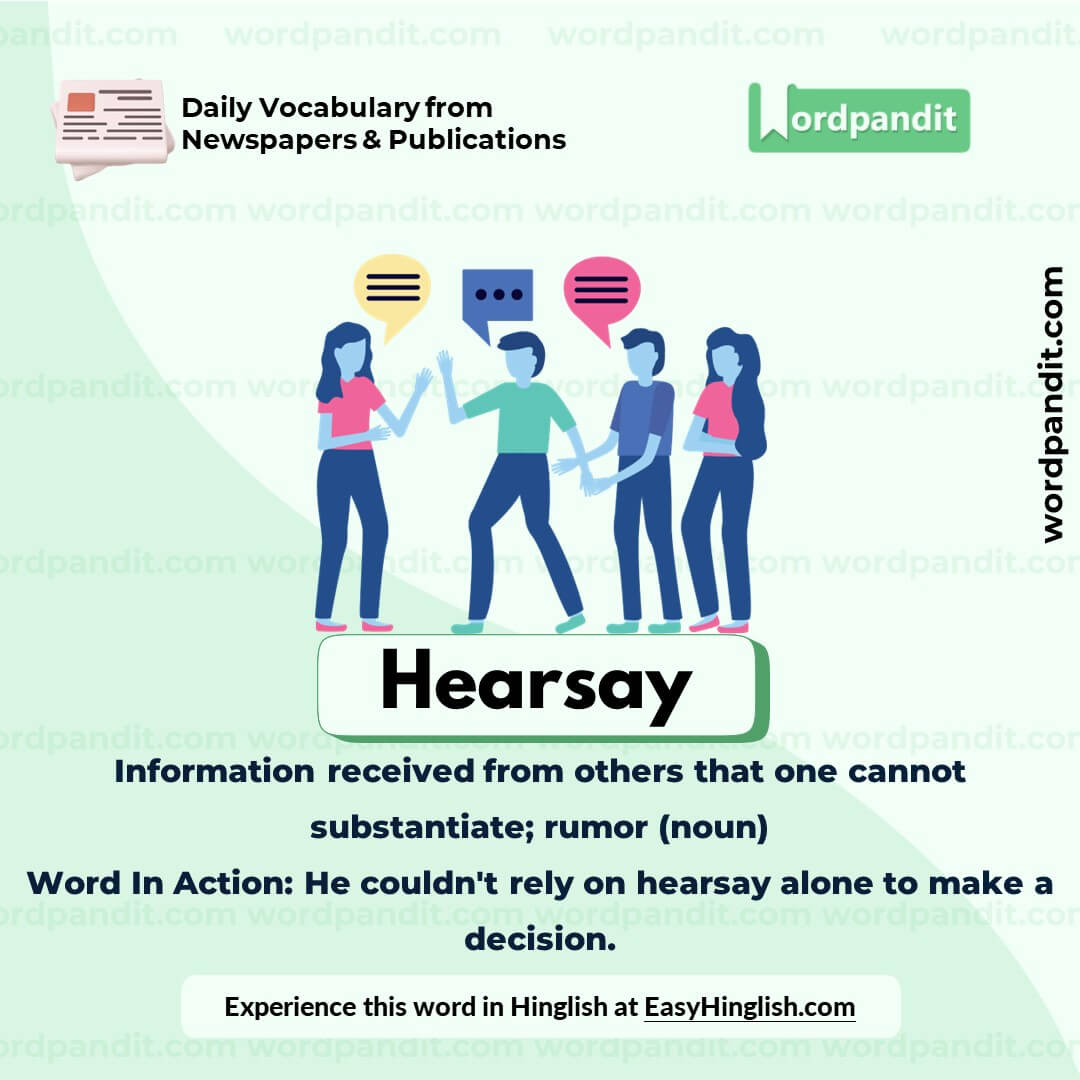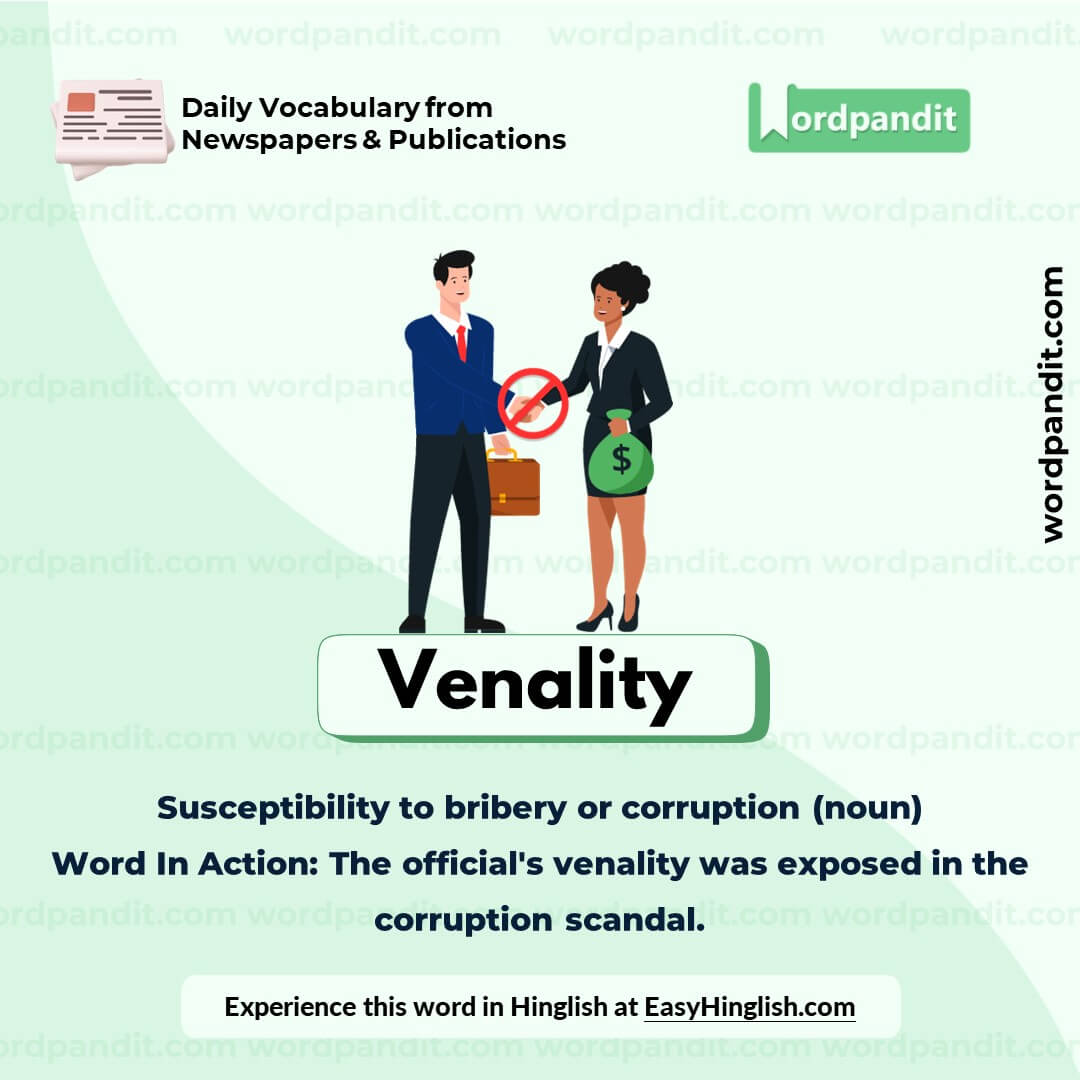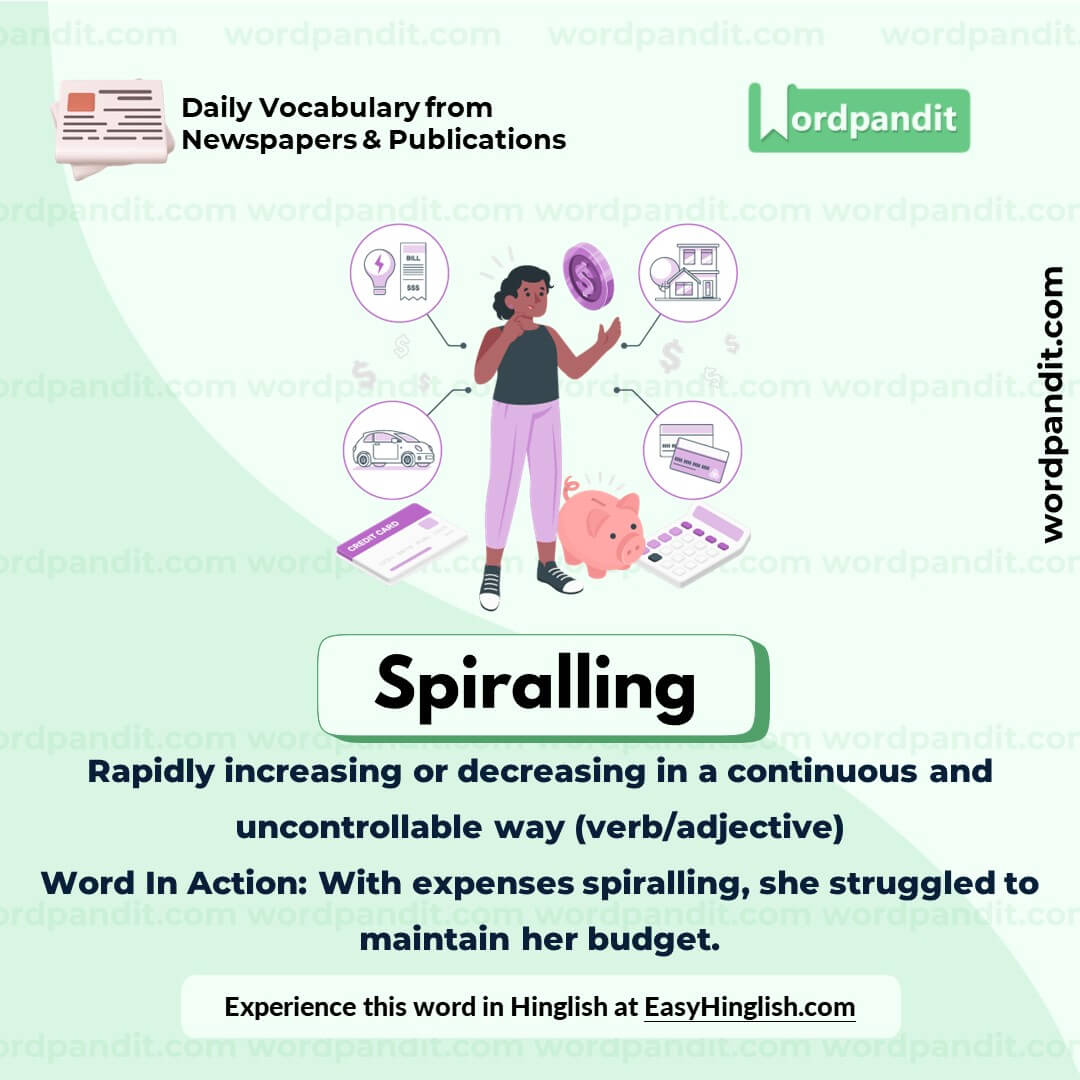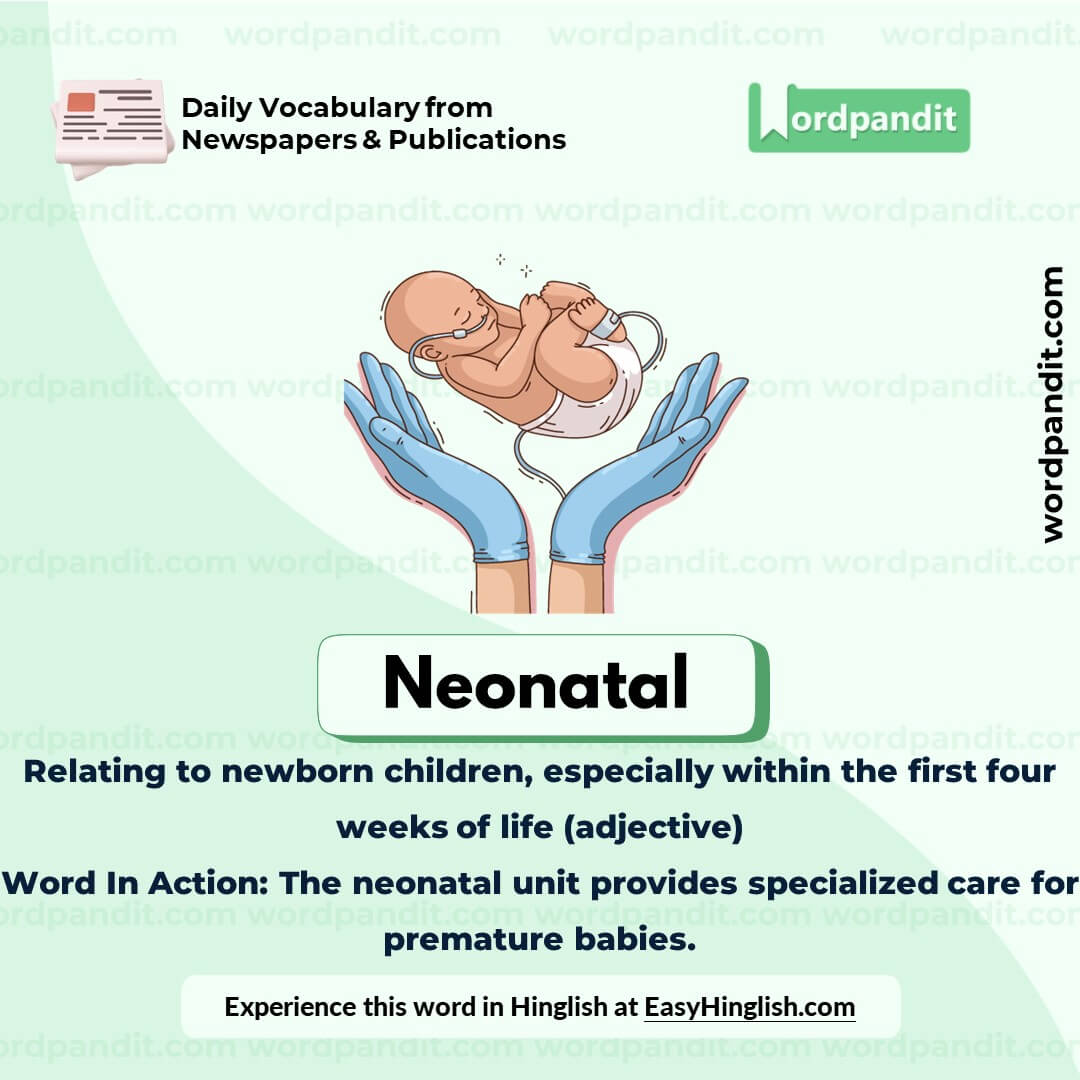Daily Vocabulary from Indian Newspapers and Publications
Welcome to Wordpandit’s Indian Vocabulary Hub
At Wordpandit, we understand the importance of staying rooted in the local context while expanding your language skills. This section focuses on enriching your vocabulary with words and phrases drawn from India’s leading newspapers and publications, ensuring you're learning vocabulary that is practical, relevant, and uniquely Indian.
Why Indian Sources Matter
We believe that the best way to master any language is by immersing yourself in local content. That’s why we carefully curate vocabulary from top Indian publications, including:
- The Hindu
- The Times of India
- The Economic Times
- Hindustan Times
- Live Mint
- The Indian Express
- And many others...
Stay Updated, Stay Relevant
With daily updates from Indian news sources, you’ll be consistently learning words that reflect the trends and shifts in Indian society and culture. Our focus is to provide vocabulary that enhances your understanding of the language in an Indian context.
How Wordpandit Supports Your Goals
Whether you’re preparing for exams, aiming to improve your professional communication, or simply want to stay connected with the latest Indian vocabulary, Wordpandit is here to guide you every step of the way.
Learn with a Practical Approach
Our interactive learning methodology includes real-world examples, engaging activities, and context-specific usage to ensure that every word becomes part of your active vocabulary.
Dive into Indian Vocabulary Today!
Why Choose Wordpandit?
Practical Learning: Focus on words you'll actually encounter in real-world reading, enhancing your comprehension and communication skills.
Diverse Content: From current affairs to scientific breakthroughs, our varied sources expose you to vocabulary across multiple domains.
Effortless Integration: Make Wordpandit a part of your daily routine. Just a few minutes each day can significantly boost your lexicon over time.
Your Path to Vocabulary Mastery
- Visit our Daily Vocabulary section regularly
- Explore new words and their usage in context
- Practice incorporating these words into your own writing and speech
- Track your progress as your vocabulary expands
Start Your Journey Today
Embark on your vocabulary enhancement journey with Wordpandit. By consistently engaging with our daily posts, you'll build a robust vocabulary that serves you well in academic, professional, and personal contexts.
Remember, a word a day keeps linguistic limitations at bay. Make Wordpandit your daily companion in the quest for vocabulary excellence!
WORD-1: Hearsay
Context:
"Nearly everyone in the ruling party, and several in the opposition, believe that a Hindu-past – dimly seen, largely unrecorded and based on hearsay – that existed prior to the arrival of Islam, is the real essence of Bharat." - The Wire
Explanatory Paragraph:
The term hearsay refers to information or assertions passed from person to person, usually without solid evidence or verification. It implies a reliance on informal sources or secondhand accounts that may be speculative or unreliable.
Meaning: Information received from others that one cannot substantiate; rumor (noun)
Pronunciation: HEER-say
Difficulty Level: ⭐⭐ (Beginner)
Etymology: Originates from the Middle English phrase hearsay, combining “hear” and “say,” implying something heard from another person.
Synonyms & Antonyms:
Synonyms: rumor, gossip, unverified report, word of mouth
Antonyms: fact, evidence, proof, testimony
Usage Examples:
- The journalist could not include the claim in her article because it was only hearsay and lacked evidence.
- The court dismissed the statement as hearsay, as it wasn’t backed by any witnesses.
- He was surprised to learn that the promotion rumor was just hearsay with no real basis.
- Though based on hearsay, the legend of the haunted house attracted numerous curious visitors.
Cultural Reference:
"Hearsay evidence is not admissible in a court of law." - A common legal principle highlighting the unreliability of unverified accounts.
Think About It:
Why do people tend to believe and spread information that is only hearsay? What impact does this have on society?
Quick Activity:
Think of a recent rumor or piece of hearsay you heard. Reflect on whether it was ever proven true or false. Write down how the rumor affected your perception of the people involved.
Memory Tip:
Remember "hearsay" as "heard someone say," emphasizing its basis in secondhand information rather than fact.
Real-World Application:
Hearsay is often encountered in social interactions, media, and legal contexts, reminding us to question the credibility of information, especially when it lacks firsthand evidence.
WORD-2: Venality
Context:
"It is true that India’s history, like any other ancient civilisation, has been marked by wars, mass bloodshed, hierarchical grading and venality." - The Wire
Explanatory Paragraph:
The word venality refers to the quality or willingness to be corrupt or easily bribed. It describes behavior driven by selfish motives, often at the expense of integrity. Venality is commonly used in contexts involving politics, government, and other systems where corruption can undermine fairness and justice.
Meaning: Susceptibility to bribery or corruption (noun)
Pronunciation: vee-NAL-i-tee
Difficulty Level: ⭐⭐⭐ (Intermediate)
Etymology: From the Latin word venalis, meaning "for sale," indicating a willingness to accept money in exchange for certain actions or decisions.
Synonyms & Antonyms:
Synonyms: corruption, bribery, dishonesty, graft
Antonyms: integrity, honesty, incorruptibility, morality
Usage Examples:
- The politician's venality was exposed when secret payments from corporate interests came to light.
- Venality in the justice system can lead to wrongful verdicts and erode public trust.
- Many citizens protested against the government’s venality, demanding fair and transparent leadership.
- The company sought to eliminate venality by implementing strict anti-bribery policies.
Cultural Reference:
"Power tends to corrupt, and absolute power corrupts absolutely." - Lord Acton, describing the inherent risk of venality in positions of power.
Think About It:
Why might people in positions of power be more susceptible to venality, and what safeguards could help prevent it?
Quick Activity:
Think of a recent news story involving political corruption. Reflect on how venality affected the situation and its consequences on society. Write a few sentences summarizing your thoughts.
Memory Tip:
Remember "venality" by linking it to "venal," which sounds like "venom," reminding us of the poison that corruption can bring to society.
Real-World Application:
Understanding venality helps in recognizing and challenging corruption in various systems, from local governance to global organizations, where transparency and accountability are essential for fairness.
WORD-3: Consortium
Context:
"The consortium of lenders, represented by GLAS Trust LLC (GLAS) initiated proceedings to take control of Alpha, Inc. and filed a bankruptcy plea in a Delaware court." - The Hindu
Explanatory Paragraph:
A consortium is a group of organizations, companies, or individuals who come together to pursue a shared objective, usually involving significant business or financial projects. Consortia often pool resources and expertise to achieve goals that would be difficult for a single entity to accomplish alone, such as financing a large venture or managing joint assets.
Meaning: An association or group formed for a common purpose, often in business or finance (noun)
Pronunciation: kən-SOR-shum
Difficulty Level: ⭐⭐⭐ (Intermediate)
Etymology: From Latin consortium, meaning "partnership" or "association," which stems from consors meaning "partner" or "sharer."
Synonyms & Antonyms:
Synonyms: alliance, partnership, association, coalition
Antonyms: individual, competitor, rival
Usage Examples:
- A consortium of tech companies joined forces to develop new standards for data privacy.
- The government awarded the construction contract to a consortium of international firms.
- The research consortium pooled resources from universities worldwide to fund climate studies.
- Several banks formed a consortium to provide loans for the large-scale project.
Cultural Reference:
The European Organization for Nuclear Research, known as CERN, is one of the largest scientific consortia in the world, bringing together multiple countries to advance research in particle physics.
Think About It:
Why might companies or organizations form consortia rather than work independently? What advantages and challenges might this bring?
Quick Activity:
Imagine you are part of a consortium tasked with improving public transportation in your city. List two resources or strengths each member might bring to the group.
Memory Tip:
Think of "consortium" as "con-sort," meaning to "sort together," to recall that a consortium is a group collaborating toward a shared goal.
Real-World Application:
Consortia are common in sectors such as finance, research, and infrastructure, where collaboration can spread risk and leverage combined resources, leading to impactful, large-scale projects.
WORD-4: Spiralling
Context:
"He said while the government is implementing the Ladki Bahin Yojana, under which underprivileged women are provided a monthly stipend of ₹1,500, the inflation is spiralling, making essential commodities costly for common citizens." - The Hindu
Explanatory Paragraph:
The term spiralling describes a situation or condition that is rapidly increasing or decreasing, often out of control. When applied to economic issues like inflation, it suggests that prices are escalating continuously, leading to a worsening situation. It can also refer to any process that intensifies in a circular or escalating manner.
Meaning: Rapidly increasing or decreasing in a continuous and uncontrollable way (verb/adjective)
Pronunciation: SPY-ruh-ling
Difficulty Level: ⭐⭐ (Beginner)
Etymology: From the word spiral, which originates from the Latin spiralis, meaning "coil" or "twist," referring to a movement that circles outward or inward.
Synonyms & Antonyms:
Synonyms: escalating, climbing, intensifying, surging
Antonyms: stabilizing, leveling off, decreasing, declining
Usage Examples:
- The spiralling costs of housing have made it difficult for young families to buy homes.
- The country is trying to control the spiralling crime rates in urban areas.
- The spiralling tension between the two countries has raised concerns in the international community.
- Her medical expenses kept spiralling due to unexpected complications.
Cultural Reference:
The 2008 financial crisis is often associated with spiralling economic conditions, where the collapse of major financial institutions led to a rapid increase in unemployment and poverty globally.
Think About It:
What are some factors that can cause prices or situations to start spiralling out of control? How can societies attempt to manage such issues?
Quick Activity:
Think of a time when you felt your workload was spiralling. Write down two strategies you used (or could have used) to regain control.
Memory Tip:
Think of "spiralling" as a "spiral staircase" that keeps going up or down, just like prices or emotions that intensify uncontrollably.
Real-World Application:
Understanding spiralling trends is useful in finance and psychology, where rapid changes need to be managed to prevent negative outcomes like financial instability or stress escalation.
WORD-5: Neonatal
Context:
"There was a model of subdistrict specialised care in the form of a first referral unit, or FRUs — four per district in 600 districts of the country to provide emergency obstetric and neonatal care." - The Hindu
Explanatory Paragraph:
The term neonatal refers to the period immediately following birth, typically the first month of a newborn’s life. In healthcare, neonatal care focuses on the special medical attention required by newborns, especially those who may be premature or have other health challenges during this critical stage.
Meaning: Relating to newborn children, especially within the first four weeks of life (adjective)
Pronunciation: NEE-oh-nay-tuhl
Difficulty Level: ⭐⭐ (Beginner)
Etymology: From Greek neo meaning "new" and Latin natalis meaning "of birth"
Synonyms & Antonyms:
Synonyms: newborn, infant, postnatal (relating to the period after birth)
Antonyms: adult, mature
Usage Examples:
- The hospital’s neonatal unit is equipped to care for premature babies who need specialized attention.
- Her research focused on neonatal health and the factors affecting infant mortality rates.
- Neonatal nurses are trained to monitor newborns for any signs of distress or complications.
- The neonatal period is crucial for the healthy development of newborns.
Cultural Reference:
The establishment of neonatal intensive care units (NICUs) in hospitals worldwide has revolutionized infant care, significantly improving survival rates for premature and at-risk newborns.
Think About It:
Why do you think specialized neonatal care is important? What might be some of the challenges faced by healthcare providers in this field?
Quick Activity:
List three key aspects of neonatal care and explain why each is vital for a newborn’s health.
Memory Tip:
Remember "neonatal" by associating "neo" with "new" and "natal" with "birth," referring to the newborn stage right after birth.
Real-World Application:
Neonatal care is essential in medical practices, especially for preterm or high-risk births, as it provides specialized care to support the most vulnerable infants in their earliest days.















